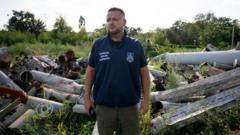Sanctions and Resilience: Russia's Continued Influence on Ukraine's Front Line
3 min read

In the wake of ongoing conflict in Ukraine, particularly in the embattled region of Kharkiv, the evidence of destruction is both stark and sobering. Despite the imposition of stringent international sanctions aimed at curbing Russian aggression, the wreckage left behind tells a different story. Investigators on the ground are meticulously gathering evidence of Russian attacks, shedding light on how Russia has managed to sidestep these economic barriers.
Historical Context: The Role of Sanctions
Sanctions have long been a tool of international diplomacy, deployed to coerce, deter, or punish states that flout global norms. Historically, their effectiveness has varied. The Soviet era saw the use of sanctions, albeit with mixed results, as a means to exert pressure during the Cold War. More recently, the annexation of Crimea in 2014 led to a fresh wave of sanctions against Russia, which were intended to isolate its economy and force a policy shift.
However, Russia's economic landscape has shown resilience. A combination of domestic resourcefulness, strategic alliances, and black-market networks has enabled it to withstand and adapt to these financial constraints. This tenacity is once again on display as the conflict in Ukraine drags on.
The Current Situation in Kharkiv
Kharkiv, a city that has become synonymous with resistance, is a poignant symbol of the broader struggle facing Ukraine. The ongoing conflict has resulted in severe infrastructure damage and humanitarian crises. The visual evidence of twisted metal and shattered buildings underscores the intensity of Russian military operations.
Investigators are now in the painstaking process of collecting and analyzing debris to understand the scope of Russian attacks and the origins of the weaponry used. This work is crucial for both legal and strategic purposes, as it aids Ukrainian and international bodies in understanding the nature and extent of Russian military capabilities and logistics under sanction pressure.
How Russia Dodges Sanctions
The ability of Russia to continue its operations in Ukraine, despite international sanctions, speaks to several factors:
Resourcefulness: Russia has cultivated alternative trade routes and alliances, particularly with nations less inclined to enforce Western sanctions. This has allowed it to import necessary goods and technology covertly.
Economic Adaptation: The Russian economy has adapted to sanction-induced constraints by developing domestic alternatives to previously imported goods, particularly in critical sectors such as technology and defense.
Cyber Capabilities: Russia has leveraged its formidable cyber capabilities to disrupt and manipulate financial systems, potentially allowing it to bypass certain economic restrictions.
State Support: The Russian government has also provided substantial support to key industries, ensuring their survival and continued output in the face of external pressures.
Conclusion: The Road Ahead
The situation in Ukraine remains a stark reminder of the complexities involved in enforcing international sanctions. While the sanctions aim to deter aggression and bring about peace, their effectiveness is often undermined by the target's adaptability and resilience. The evidence gathered in Kharkiv serves as a testament to Russia's continued defiance and the limitations of the current sanctions regime.
Moving forward, the international community must reconsider its approach. This might involve tightening existing sanctions, increasing diplomatic efforts to isolate Russia further, or even leveraging new technologies to inhibit sanction evasion. The goal remains clear: to bring about a peaceful resolution to the conflict and uphold international law.
Ultimately, the resilience shown by Russia in the face of sanctions challenges the global community to innovate and collaborate more effectively in its pursuit of peace and stability in Ukraine.
Source: On Ukraine's front line, twisted wreckage shows sanctions haven't yet stopped Russia
